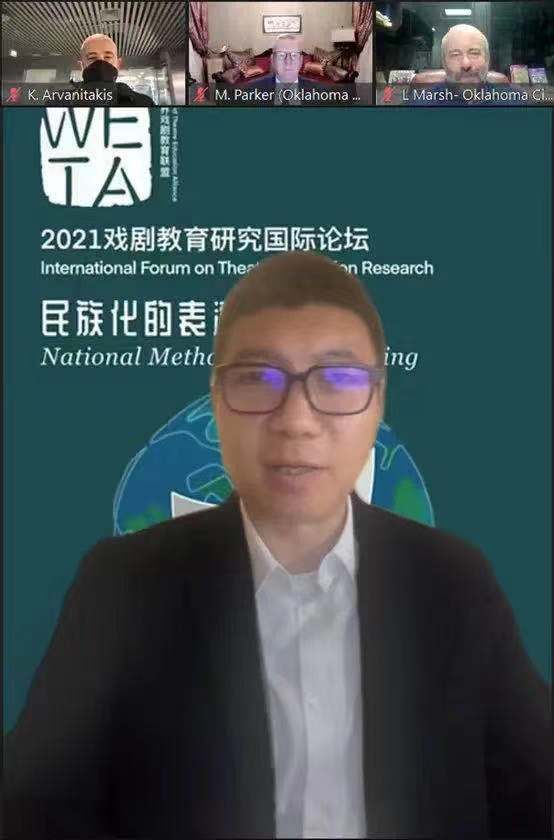World Theatre Education Alliance
2021 International Forum on Theatre Education Research Successfully Held

On Oct. 28, 2021 WTEA International Forum on Theatre Education Research themed as 'National Methodology for Acting' was successfully held online by the Central Academy of Drama. The forum was attended by over 60 guest speakers, representatives, and students from WTEA member schools, including the Central Academy of Drama (China), Shota Rustaveli Theatre and Film Georgia State University (Georgia), Athens Conservatoire Drama School (Greece) Toho Gakuen College of Drama and Music (Japan), Chung-Ang University Department of Theatre (Korea), Aleksander Zelwerowicz National Academy of Dramatic Art (Poland), Russian Institute of Theatre Arts (GITIS) (Russian), Russian State Institute of Performing Arts (Russian), and Oklahoma City University School of Theatre (the USA).
Director Ju Ping of the CAD' s International Relations Department acted as the moderator for the first session, which started at 18:30 (GMT +8). To kick off the event, Prof. Tobias Biancone, Director General of International Theatre Institute, delivered an opening speech, followed by the keynote speech by President Hao Rong of the CAD (also Secretary General of WTEA), titled as 'Mutual Learning for Cultural Diversity'. In his speech, Prof. Hao proposed to adopt acting methods from Quyi (a traditional Chinese oral performing art) in acting trainings, to both enrich acting skills and to bring Chinese culture to the world stage. Then Mr. Chris Wang, an important representative of Edinburgh Festival Fringe, shared his experience in advertising Chinese and Asian theatrical cultures via Edinburgh Festivals in recent years.

The second session, the seminar, was moderated by Prof. Jiang Ruoyu with the Acting Department of the CAD. Linked by Prof. Jiang's comments and questions, guests speakers engaged in heated and fruitful discussions about the physical trainings for acting and other issues concerning actors’ education.
Dr. Zhang Changjie from China explained that the character building process of 'Xiangsheng' and 'Shuanghuang' was similar to that in Brecht's theory, a trace of academic borrowing. Prof. Jiang pointed out the common ground between Ancient Greek and Chinese theatre art: the appearance of masks and the engagement of chorus, after Prof. Constantina Ziropoulou briefly went through her paper. The latter then added that Ancient Greek drama was more like enlightening and inspiring treasure for contemporary theatre, and that modern theatrical practitioners were stretching the boundary of ancient works.
Prof. Kang Min-Ho from Korea shared the details of his application of the sensory and animal training method by Strasbourg in his class. Mr. Marcin Bartnikowski from Poland elaborated on his Mirror exercise and his requirement of students to actively comment on their peers' performance with reason and specifics, so that the students would get more involved in class. Mr. Krzysztof Ogłoza, also from Poland, allowed his students plenty of room for making mistakes in order to act out of the box, as he was working to update his school’s training method into a more open one.
Then, 3 professionals from Russian, namely Prof. Nikolai Pesochinsky, Ms. N. E. Shurganova, and Ms. Natalia Nazarova, talked about their researches on Stanislavsky system and especially the Etude method, which was an improvisation exercise prevalent in Russia. Prof. Lance Marsh from the USA put forward the concept of 'seven demons' that hindered young actors from constant self-enhancement, before he provided some measures against these 'demons' that have been proven effective by him and his colleagues.
The forum ended with Prof. Hao Rong’s concluding remark, in which he affirmed that theatre was the concrete bond for WTEA, and expressed his wish for a brighter future for WTEA and vis-a-vis exchange as soon as possible.
4 hours was simply not enough when old friends and new comers were all excited to see each other under a topic that each of them had something to contribute to. As this year's event was about to come to an end, we already started to look forward to our next gathering.

